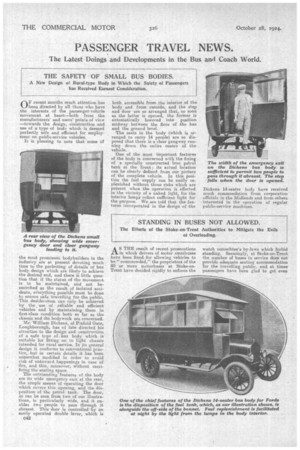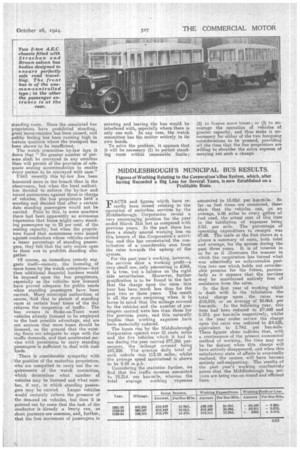STANDING IN BUSES NOT ALLOWED.
Page 26

Page 27

If you've noticed an error in this article please click here to report it so we can fix it.
The Efforts of the Stoke-on-Trent Authorities to Mitigate the Evils of Overloading.
AS THE result of recent prosecutions in which drivers of motor omnibuses have been fined for allowing vehicles to be "overcrowded," the proprietors of the 80 or more motorbuses at Stoke-onTrent have decided rigidly to enforce the
watch committee's by-laws which forbid standing, Seemingly, at Stoke-on-Trent the number of buses in service does not provide adequate seating accommodation for the travelling public, and at times passengers have been glad to get even standing room. Since the associated bus proprietors have prohibited standing, great inconvenience has been caused, and public feeling has been running high in certain quarters where the transport has been shown to be inaufficient.
The watch committee by-law lays it down that " No greater number of persons shall be conveyed in any omnibus than will permit of the provision of adequate seating accommodation to enable every person to be conveyed with ease." Until recently this by-law has been honoured more in the breach than in the observance, but when the local authorities decided to enforce the by-law and issued, summonses against those in charge of vehicles, the bus proprietors held a meeting and decided that after a certain date standing passengers would not be carried. Prior to this, in some quarters there had been apparently an erroneous impression that buses might carry standing passengers up to 25 per cent, of the seating capacity, but when the proprietors found that summonses were issued against conductors whose vehicles carried a lesser percentage of standing passengers, they felt that the only course open to them was to prohibit standing altogether.
Of course, an immediate remedy suggests itself—namely, the licensing of more buses by the watch committee—but' then additional financial burdens would be imposed upon the bus proprietors, especially as the vehicles now licensed have proved adequate for public needs when standing passengers have been carried. Many municipal authorities, of course, find that to permit of standing room at certain busy times of the day relieves the congestion of traffic. This bus owners in Stoke-on-Trent want vehicles already licensed to be employed to the best possible advantage, and are not anxious that more buses should be licensed, on the ground that the existing fleets are adequate to cope with the traffic demands, and that accelerated service with permission to carry standing passengers is sufficient to deal with rush loads.
There is considerable sympathy with the position of the motorbus proprietors, who are compelled to carry out the requirements of the watch committee, which determines what number of vehicles may be licensed and what number, if any, in which standing passen gers may be carried. Larger vehicles would certainly relieve the pressure of the demand on vehicles, but then it is pointed out by some that the task of the conductor is already a heavy one -as short journeys are common, and further, that the free movement of Passengers in entering and leaving the bus would be interfered with, especially where there is only one exit. In any case, the watch committee has the matter entirely in its own hands.
To solve the problem, it appears that it will be necessary (1) to permit standing room within reasonable limits; (2) to license more buses ; or (3) to encourage the operation of vehicles of greater capacity, and thus make it unnecessary for either of the two foregoing considerations to be pressed, providing all the time that the bus proprietors are willing to shoulder the extra expense of carrying out such a change.




































